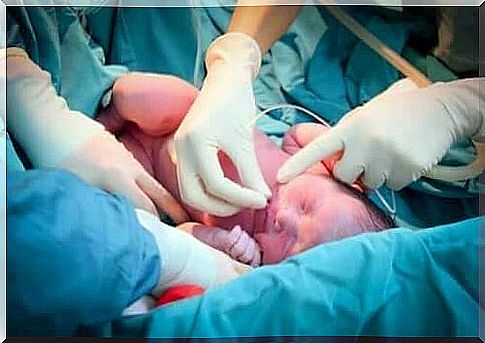Newborn Asphyxia: What Causes Oxygen Deficiency?

There are many different types of situations that can cause problems with a newborn baby. Difficulties may occur before or after childbirth, as well as during it. Newborn asphyxia is one of the potential risks, so it’s a good idea to be aware of this condition as well if you’re pregnant.
Newborn asphyxia means that the newborn baby does not get enough oxygen, and this condition can easily lead to death. A baby can develop asphyxia during childbirth, but also before or after childbirth, and the reasons for its development are very diverse.
According to a recent study, about 20% of babies who develop neonatal asphyxia die from this condition. When it comes to recovery, unfortunately, those babies who survive usually get permanent neurological problems.
Now, we’ll cover the basics of this hypoxia disorder and describe what all has been learned about neonatal asphyxia in science recently.
Asphyxia is one of the leading causes of neonatal death

For example, the World Health Organization has identified neonatal asphyxia as one of the most significant causes of death in newborn babies.
During childbirth, the doctor finds that the baby does not get enough oxygen often because this does not cry or move. Another sign of newborn asphyxia is that the baby’s body is limp.
Whatever the situation, the doctor needs to act as quickly as possible. He should monitor the situation carefully and try to find out what has caused the development of asphyxia so that he can determine the best solution to treat the problem.
A baby who is hypoxic before giving birth may need an emergency section.
What causes newborn asphyxia?
Such hypoxia can be due to a number of different factors, and the causes can vary depending on whether asphyxia occurs during, before, or after delivery.
Newborn asphyxia before delivery
This type of asphyxia can occur in any month of pregnancy, although it most commonly develops when the calculated time is near.
Therefore, it is important for the mother to undergo all routine checkups during pregnancy to ensure that everything is fine for both the baby and the mother. Some of the factors that can cause neonatal asphyxia include:
- the mother has anemia
- bleeding during pregnancy
- bad position of baby’s head
- prolonged pregnancy (more than 42 weeks)
- some type of infection in the mother
Asphyxia during childbirth
Various dangerous situations can occur during childbirth . Although doctors are best prepared for any possible problem, it is important to know that the following serious asphyxia-related problems may sometimes occur:
- the umbilical cord wraps around the baby’s neck or is pinched at some point
- pre-eclampsia, which causes an increase in blood pressure in the mother
- respiratory problems in the mother
- use of forceps in childbirth
- childbirth takes too long
Postpartum onset neonatal asphyxia

Despite the fact that the baby has already been born, she may still be at risk of experiencing a lack of oxygen, and this may be due to the following:
- premature birth – this causes the baby’s organs to be not strong enough
- congenital malformations
- lung or heart disease
- very severe underweight in the baby
In general, it can be said that if a baby has mild asphyxia he cries too much, is irritated and his muscles stand out more clearly than usual. However, this condition usually does not last longer than one day.
On the other hand, if the baby’s condition is more severe, he or she may cramp, and may lack the sucking reflex needed for breastfeeding, and the muscles may also be very weak.
Neurological damage in a baby with asphyxia
How quickly newborn asphyxia is treated and whether it causes him seizures greatly influences how likely a baby is to develop neurological damage.
Neurological damage usually occurs in an infant with asphyxia if he or she has had some type of seizure or seizure, or if the asphyxia has lasted for a long time or there have been other factors in the situation. For example, if a baby has some type of cardiovascular or lung function problem, the risk of neurological injury is higher than normal.
One thing that can increase the risk of neurological damage is acidosis in the newborn, and this means that too much acid builds up in the blood.
Because maternal health is usually monitored very closely during pregnancy, many of the things that can cause newborn asphyxia can be prevented. However, it must be remembered that there are also situations that cannot be affected by treatment.
Although certain factors are beyond human control, qualified staff who provide care whenever needed are very important both before and after childbirth. Nurses and doctors should be experienced and accustomed to the many types of problems that can arise with pregnancy in order for the process to proceed well. Newborn asphyxia can cause death, so all possible measures to prevent it are very important.









